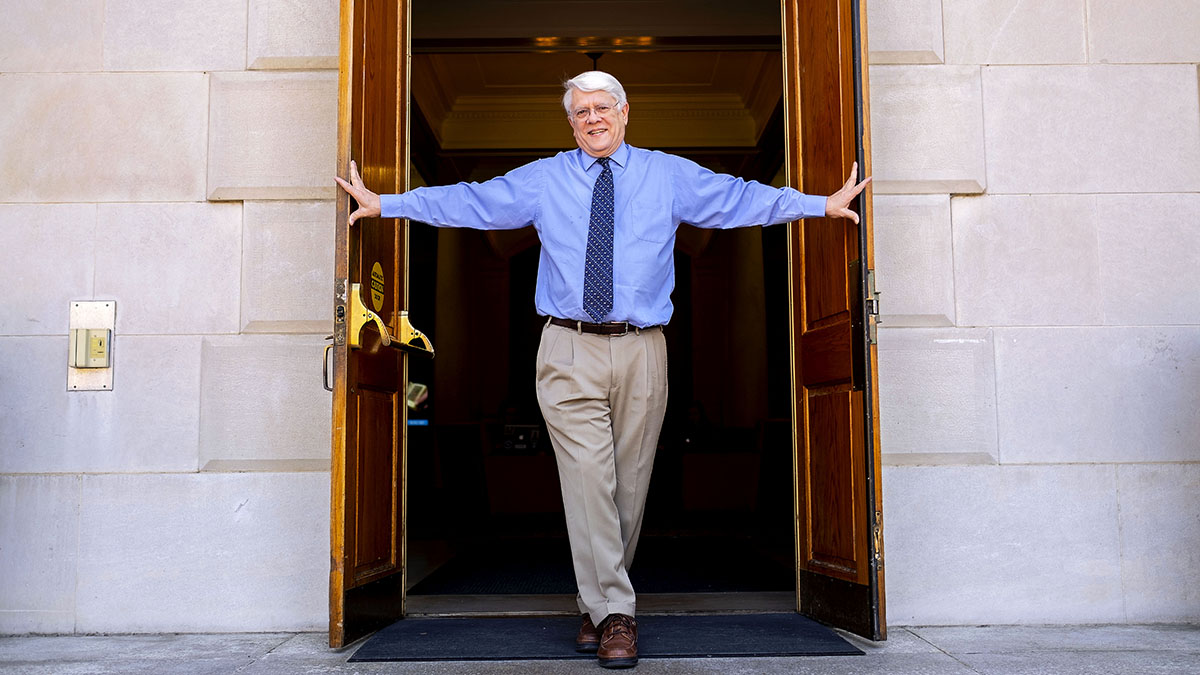‘Mr. North Carolina’ sticks to the subject he loves
Bob Anthony considers himself a "professional North Carolinian," managing 4.5 million books, maps, photographs and other cultural heirlooms in the nation's largest single state-focused collection.

Few people are more versed in the history, culture and literature of the state than Bob Anthony, the curator of the North Carolina Collection at University Libraries, and one of the recipients of the 2019 C. Knox Massey Distinguished Service Award.
Just don’t expect Anthony to tell you that.
Every morning Anthony goes to work in Wilson Library, he passes the framed portraits of the three other people who have served as curator of the collection in its 100-year history.
Those portraits, Anthony said, remind him he is in a special place and holds a sacred trust. They also keep him humble. Even after serving for 25 years, Anthony looks up to them as far more accomplished than he will ever be.
Unlike them, he has not written any books, earned a doctorate or conducted his own research. “I am no scholar,” he insists again and again whenever anyone tries to give him more credit than he believes he deserves.
What he will admit to, as he told the News & Observer in 2016, is being a “professional North Carolinian,” ready with information about everything from the state’s agriculture to its authors, its barbecue to its beaches, and from the tiniest towns to the cities of Charlotte and Raleigh.
‘A model of service’
Yet it may be his unassuming nature that allows him to remain so attentive to what so many other people are doing — and so eager to help. Researchers from across the University and the state turn to Anthony, in every field imaginable, to advance their work, said University Librarian Elaine Westbrooks.
“I introduced a professor of public policy to Bob, and she came away from the encounter with a transformed research agenda,” Westbrooks said. “His ability to connect her with critical research about North Carolina has advanced her study of the impact of hurricanes on schools in rural and underserved areas. Her experience is far from unique.”
Under his direction, the Collection has published books in partnership with UNC Press about important figures in the history of the University and has produced conferences on topics such as North Carolina food, state political campaigns, and most recently, the life of Sir Walter Raleigh, which drew participants from as far as the United Kingdom.
Fellow Massey winner Lynn Blanchard, director of the Carolina Center for Public Service, got to know Anthony through their association with the Tar Heel Bus Tour, for which Anthony served as the “go-to person” who provided the exact information needed in just the right amounts. “He is a model of service to the citizens of the state, but he does not seek recognition. He does it because it is who he is and what he believes,” Blanchard said.
Adapting to the digital age
Although a supreme curator — he manages 4.5 million books, maps, photographs and other cultural heirlooms in the nation’s largest single state-focused collection — his greatest gift may be his ability to find ever more ways to connect information to people in ways they find meaningful.
“With his long experience at Carolina, Bob is well known throughout the state. He is generous with colleagues old and new and takes pride in being able to introduce people who might not otherwise have met, helping to build bridges and spawn new partnerships and collaborations,” wrote his colleagues.
For instance, when Anthony took over the Collection in 1994, it did not have a web page; today, no other state has digitalized as many of its historical collections as North Carolina. Anthony’s leadership is a big reason why, wrote Associate University Librarian Maria Estorino, University Archivist Nicholas Graham and Jason Tomberlin, head of Special Collections research and instructional services, in their joint nominating letter.
Projects that Anthony helped to initiate include the Documenting of the American South digital library, and more recently, the transformative work of the North Carolina Digital Heritage Center. In 10 years of operation, the center has partnered with 237 libraries, museums and archives across 82 counties to digitize and publish online hundreds of thousands of newspapers, yearbooks, city directories, photographs, audiovisual recordings and objects.




